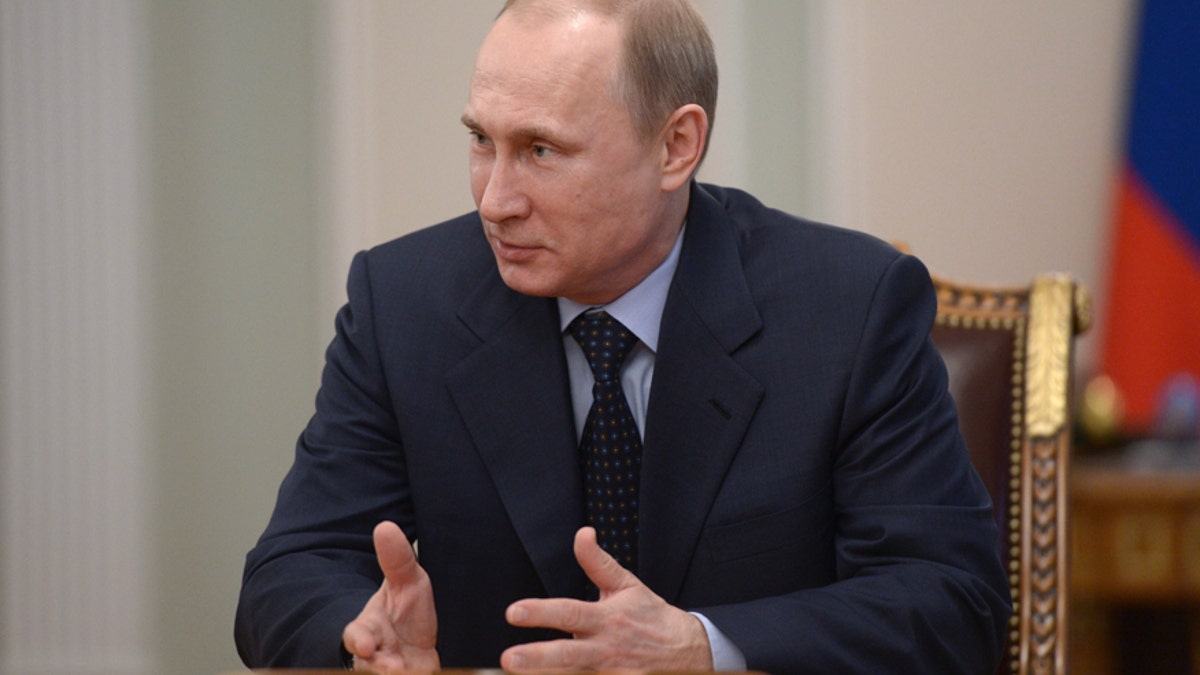
Russian President Vladimir Putin. (AP)
Vladimir Putin’s aggressive move to seize Crimea and to threaten Ukraine has led commentators to call him unflattering names: unhinged leader, Cold Warrior, neo-fascist, troubled dictator and retrograde leader stuck in the 19th century. But to understand Putin we need to look at the world not from our Western perspective but from his Russian perspective.
World War II, as Studs Terkel declared, was a “good war” for the U.S. that led to superpower status, economic boom and atomic monopoly.
For the Soviet Union, victory over Nazi Germany led to the deaths of 10 million soldiers and 17 million civilians while another 25 million people lived in holes in the ground by 1945.
[pullquote]
While the disintegration of the Soviet Union was a major victory for the West, it was for Putin, the greatest disaster of the 20th century.
Russia, losing half its population and Eastern European empire, went from being a superpower to being derisively called “upper Volta with nuclear weapons.”
Earlier in the 20th century there were other disasters: the Japanese victory in the 1905 Russo-Japanese War, massive defeats in World War I that led to the February and October Revolutions, the Russian Civil War (11 million deaths) and the horrors of the 1930s.
Putin is well aware of the shrinkage in Soviet power and internal problems. The 300 million people in the Soviet Union in 1991 have dropped today precipitously to a mere 143 million people. With demographic decline (low birth rate, 60-year male life expectancy, huge alcohol consumption, emigration), by 2050 there may be only 100 million people left in Russia -- and many of them will be Muslims, not Putin’s Russian Orthodox.
While the Soviet economy was 50 percent of that of the United States, it has shrunk to 13 percent of its rival with the profile of a Third World country. With terrible agricultural and consumer good sectors, weak high tech, little entrepreneurship and massive corruption, only an unlikely skyrocketing of the price of its main export -- oil and gas -- could rescue the economy as it did from 2000 to 2010.
Its vaunted military, which once threatened to push to the English Channel, has withdrawn from the center of Europe to defend Moscow and Saint Petersburg. The Red Army that defeated the Wehrmacht at Moscow, Stalingrad and Berlin in World War II, lost to the poorly equipped and trained Chechens in 1994-1996 and did only modestly better in a rematch four years later.
Putin, who wants to continue as president until at least 2024, needs to pull a few rabbits out of the hat. By stressing the primacy of the Russian Orthodox Church, he caters to the conservative inclinations of middle and smaller towns and rural areas. He woos them by his macho escapades and espousal of Russian nationalism that was deeply wounded by the 1991 disintegration of the Soviet Union.
The American unwillingness to use military force internationally, failure to lead in Libya and Syria, preference for the Egyptian Muslim Brotherhood over the pro-American military, and perception that it is “soft” on the Iranians has provided Russia a golden opportunity to regain its global stature, especially in the Middle East.
In Syria, through providing 4.5 billion dollars worth of arms, the Russians have saved Bashir Assad.
In Egypt, after being kicked out in 1972 and 1977, they have now signed a $2 billion dollar arms deal with the formerly pro-American Egyptian military.
They are now in discussions with Saudi Arabia over help in the face of a rising Iran.
The West Bank Palestinians, seeing Russia stand by Assad, are leaning towards Moscow.
Even the Israelis, as seen in Bibi Netanyahu’s visit to Moscow, by selling UAVs to the Russians and allowing 600,000 Russians to visit Israel without a visa, have tilted mildly towards Russia.
In Asia, Japan’s pro-American Prime Minister Shinzo Abe, fearing the rise of China, has twice visited Moscow recently and sat next to Putin at the Sochi Olympics.
In Central Europe conservative Hungarian Prime Minister Victor Orban is, despite memories of the Russians crushing the 1956 Hungarian Revolution, emulating the Russian model of authoritarianism and oligarchs.
Putin’s tough realist policy remains more popular in many parts of the world than Obama’s soft idealist approach.
The fact that none of the four BRIC countries supported the American position at the U.N. over Crimea may augur poorly for the future of a soft American policy -- and show the wisdom of Forbes in naming Vladimir Putin the most powerful man in the world.
